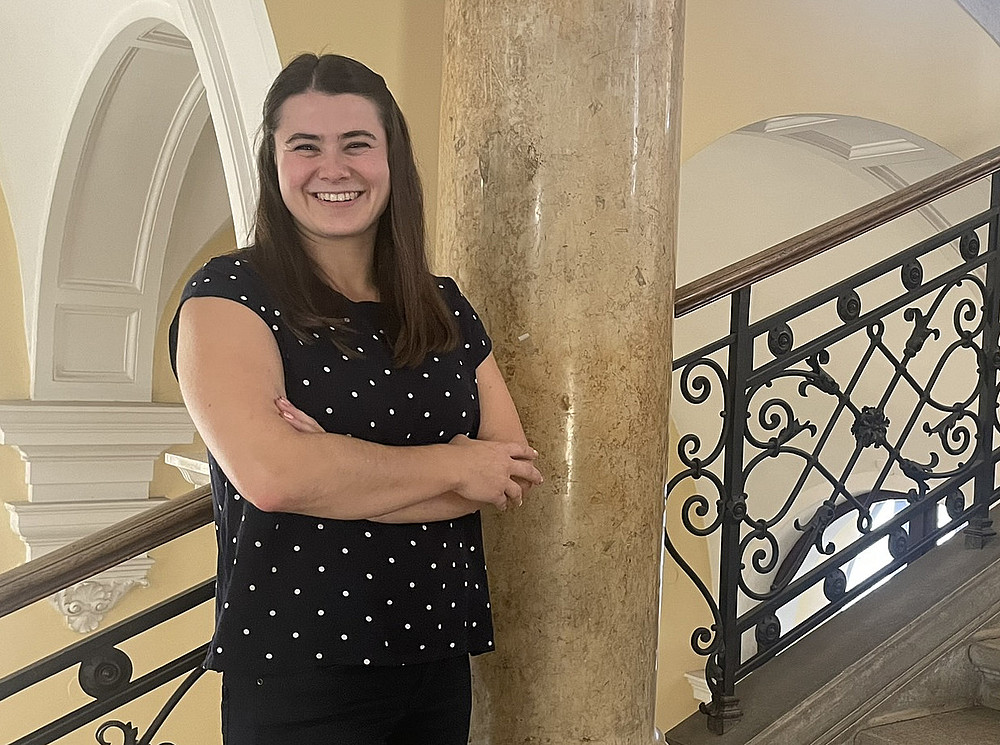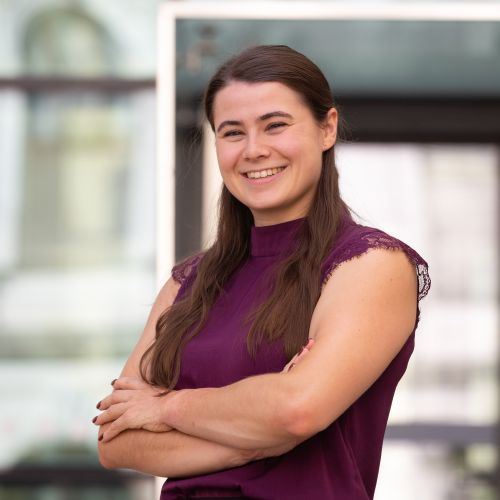"I like having questions and being able to answer them."

Are mathematicians from another planet? Michaela Meier investigated this question in her dissertation. In her research, she also looks at how much mathematical creativity non-geniuses bring to light.
When most people think of creativity, they think of art - literature and music, but not mathematics. However, it is precisely this topic - mathematical creativity - that Michaela Meier deals with in her research in the Talent Research Unit at the Institute of Psychology at the University of Graz. You don't need Einstein's level of mathematics to be creative in mathematics - it already works at school level, she emphasizes. This is because mathematical problems have right and wrong solutions, but there are often several correct ways to solve them: "Obvious ones that you come up with quickly and more original ones," explains Michaela Meier.
Michaela Meier is a member of the "Plurality and Diversity" research cluster in the Future Education research network.
It is therefore uncreative to name the six when it comes to finding similarities between the two numbers "16" and "36". It is more creative to identify both as square numbers. "The question is: What prerequisites do I need to solve the task creatively? The second answer requires mathematical knowledge - and intelligence, which always plays a role in mathematics." Conversely, it does not mean that you can give this answer even if you know what square numbers are.
But Michaela Meier is not only researching mathematical creativity. She also focuses on concept development and talent development. Research into concept development is about finding out what happens psychologically later on with concepts that we form early in life. "Not everything we believe as children turns out to be correct in the light of the knowledge we acquire later," she says. "As a child, we assume that the sun revolves around the earth because that's what we see and observe. Later, we learn that it's the other way around. But the early concepts don't just disappear - they are still there and interfere."
She finds it particularly interesting that a study has shown that even math students and science professors stick to these naive concepts to a certain extent. "They may answer faster than non-experts, but they also make mistakes in this context." For school lessons, for example, this means that raising awareness of the existence of this phenomenon can help to build knowledge.
Finally, Michaela Meier looked at talent development as part of her dissertation. She compared mathematicians and non-mathematicians in terms of their mathematical expertise. "I looked at whether they are a different species," she says with a wink. "In other words, whether there are differences in general cognitive abilities and personality." It turned out that the basic numerical precursor skills do not show any major differences, but that mathematicians show a greater interest in the subject matter and that their attitude towards mathematics is more positive than that of non-mathematicians. "So some are good at math, and some also have the cognitive skills. But only a few of them actually decide to pursue a career in mathematics," says Michaela Meier. "The question is: what drives the latter to choose mathematics?"
The question is also: what drives Michaela Meier to explore all these topics? This career path was not at all clear to her from the outset. Three subjects originally made it onto her shortlist: Medicine, Psychology and Archaeology. "I was too late for the medical entrance exam, and the archaeology course mainly consisted of Greek and Roman architectural history. That left me with psychology."
Becoming a clinical psychologist was never an option for her, and so she eventually "slipped into" her research topics, as she puts it. Her Master's thesis was on giftedness research, and it just so happened that a doctoral position was advertised at the same time. "I sent off my application the day after my Master's exam. It was a perfect fit." There were so many questions left unanswered in her Master's thesis that she wanted to answer. "I like finding things out. I like diving into a data set and seeing what I can find out. I like having questions and being able to answer questions."
Looking back, Michaela Meier can clearly answer the question of whether she would have preferred to be a doctor or an archaeologist: "No. I still enjoy watching documentaries. I still enjoy watching documentaries about excavations, but I couldn't imagine digging around," she says and laughs. And from today's perspective, medicine is no longer an option for her, if only because of the enormous responsibility involved. "What I find attractive about research is not having this responsibility. The responsibility for the data - I can handle that well! And the responsibility for my students too. After all, they're all adults!"
What does it take to be a good researcher? "The will to immerse yourself in a topic." She would definitely advise current and future students to pursue a career in research. "But only if it's something you actually want to do!" She describes herself as "privileged". "I have a super supportive line manager and a super supportive working environment. That's not something you can take for granted."
